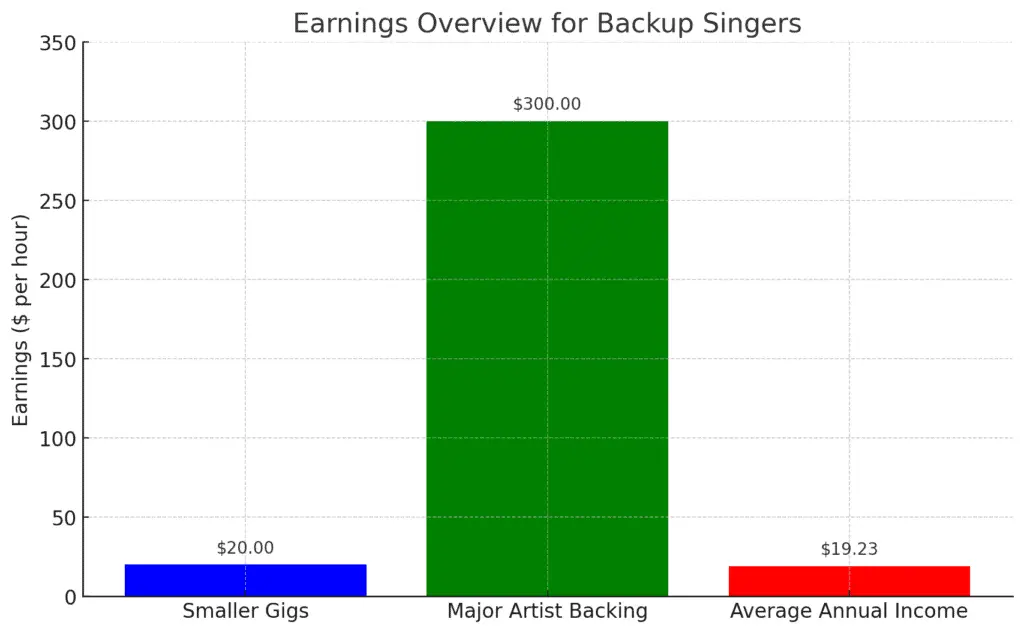
In the vast world of music, lead vocalists often bask in the spotlight, while those harmonizing in the background remain unsung heroes. Yet, how well are these essential voices compensated for their pivotal role in shaping a song?
Despite the challenges of breaking into the music industry as a backup singer, the job can be rewarding both financially and artistically.
In this article, I will dive deeper into the business of backup singer salaries, exploring their role in the music industry, the career path of a backup singer, and the financial aspects of being a backup singer. I will also discuss the demand and opportunities for backup singers, famous backup singers and their success stories, and union representation for backup singers.
Key Takeaways
- Backup singers can earn an average salary of around $40,000 per year but the amount can vary widely depending on several factors such as experience, demand, and type of gig.
- Despite the challenges of breaking into the music industry as a backup singer, the job can be rewarding both financially and artistically.
- In addition to discussing the financial aspects of being a backup singer, this article will explore the role of backup singers in the music industry, the career path of a backup singer, and the demand and opportunities for backup singers.
Table of Contents
How Much Do Backup Singers Make?
On average, a backup singer can expect to make about $20 per hour for smaller gigs and between $200 – $400 per hour when backing a major artist. These numbers vary greatly depending on the gig and the fact that in most cases backup singers are paid per gig not per hour.
According to SimplyHired.com, backup singers can earn a salary of around $63,000 per year. However, this number is very skewed since it takes the average gig payout and then estimates a yearly salary based on a full time job, which is 40 hours per week (2080 hours per year.)

Here’s the bar graph representing the earnings overview for backup singers:
- Smaller Gigs: The average hourly rate is $20.
- Major Artist Backing: The average hourly rate (between $200 and $400) is represented as $300.
- Average Annual Income: When breaking down the $40,000 annual salary into an hourly rate (based on a 2080-hour work year), it comes to approximately $19.23 per hour. In reality, though, this number is roughly cut in half since backup singers rarely work 40 hours per week.
The vast majority of backup singers aren’t singing 40 hours per week but are working an average of 15-20 hours per week. This is based on most backup singers working 3-4 jobs per week with each being about 2 hours for short gigs all the way to 5 hours for a longer gig.
How do Backup Singers get Paid?
Backup singers often get paid a flat fee per gig rather than a set hourly wage. This fee is usually negotiated before a contract is signed either by the singer or a manager if they have one. The exception to this is studio session work, these usually are paid by the hour which is also negotiated per job.
- Live Performances: Backup singers can earn money by performing live on stage with various artists or bands. They provide vocal support to the lead singer and help enhance the overall sound of the performance.
- Studio Recording Sessions: Backup singers are often hired for studio recording sessions. They contribute their vocals to tracks for albums, singles, jingles, and film/TV soundtracks, earning royalties or session fees.
- Touring with Artists: Being part of a backup singing team that tours with a famous artist or band can provide consistent income, including a salary, travel expenses, accommodations, and per diems.
- Session Singing: Beyond just backup roles, session singers may be hired for various projects, including commercials, video games, demos, and other recordings that require vocal talent.
- Corporate and Private Events: Backup singers can perform at corporate functions, weddings, private parties, and special events, earning fees for their performances.
- Cruise Ship Performances: Many cruise lines hire entertainers, including backup singers, to perform on their ships, offering a unique opportunity to earn money while traveling.
- Background Vocals for DJs and Electronic Producers: Electronic music producers and DJs often seek backup vocalists to provide human elements to their tracks, creating opportunities for backup singers to collaborate on EDM and electronic music projects.
- Radio Jingles and Voiceovers: Backup singers with versatile voices can lend their talents to radio jingles, voiceovers, and commercials, earning income from these projects.
- Virtual Performances and Livestreams: With the rise of virtual events and livestreaming, backup singers can offer their services for online concerts, workshops, and virtual collaborations.
How do Backup Singers Make Extra Money?

The erratic nature of being a singers means that you don’t always know how much you’ll be making per month, at least not until you’re established and have steady work as a session/studio singer or a regular backup singer for a touring artist.
For this reason, many singers will work other jobs...sometimes in other fields.
But for some ideas on how to supplement your singing income with other, singing related side hustles, check out this list:
- Vocal Coaching and Workshops: Experienced backup singers can offer vocal coaching and conduct workshops to aspiring singers, generating income from teaching their craft.
- YouTube and Social Media: Backup singers can build their own online presence by posting cover songs, original music, tutorials, and collaborations on platforms like YouTube and social media. Ad revenue, sponsorships, and crowdfunding can provide income.
- Backing Vocal Arrangement: Backup singers skilled in vocal arrangement can offer their services to artists and producers who need assistance in creating harmonies and vocal textures for their songs.
- Songwriting Collaboration: Backup singers who are also songwriters can collaborate with others to write songs, earning royalties from their contributions.
- Music Licensing and Sync Placements: Backup singers can have their vocals featured in TV shows, movies, commercials, and video games, earning income through music licensing and sync placements.
- Music Education: Backup singers with extensive knowledge and experience in vocal techniques can become music educators at schools, conservatories, or offer private lessons.
Do Backup Singers get Paid Royalties?
While backup singers can earn royalties, it’s less common for them to receive significant amounts compared to lead artists and songwriters. It is possible for them to earn royalties based on album releases if a member of a band, it’s less common if you’re a touring backup singer or studio session artist.
However, as the music industry evolves and awareness grows about the contributions of all artists involved in a track, there’s hope that backup singers will increasingly be recognized and compensated fairly for their work.
Here’s a breakdown of some ways backup singers may receive royalties:
- Mechanical Royalties: These are royalties generated from the sale of recorded music, such as CDs, digital downloads, and streaming. Typically, backup singers do not receive mechanical royalties unless there’s a specific arrangement in place.
- Performance Royalties: These royalties are paid when music is performed publicly, including radio play, streaming, live performances, and even in establishments like restaurants and stores. If a backup singer’s vocals are part of a recording that’s played publicly, they may be entitled to these royalties, especially if they are credited. Performance rights organizations (PROs) like ASCAP, BMI, or SESAC in the U.S. collect and distribute these royalties. Backup singers need to be registered with a PRO and ensure their contributions are credited to receive their share.
- Synchronization Royalties: These are generated when music is used in conjunction with visual media, such as in movies, TV shows, commercials, video games, etc. If a backup singer’s vocals are part of a song that’s used in this manner, they might be eligible for royalties. However, this is less common for backup singers unless they have a significant or standout role in the track.
- Residuals: In the case of television and film, backup singers may receive residuals. This means that if a TV show, movie, or commercial they sang in gets rebroadcast or redistributed, they may earn additional pay. This is especially true if they were part of a union that negotiated such terms.
- Agreements and Contracts: The key to backup singers receiving royalties often lies in the initial agreements and contracts they sign. If they’re proactive in negotiating their terms or have management that does so on their behalf, they can secure a percentage of the royalties. This is especially important if they believe the song has the potential to be a big hit.
The Career Path of a Backup Singer
Becoming a backup singer is a career that requires a lot of training and experience. Most backup singers start their careers by gaining a solid foundation in vocal training, music theory, and performance.
To become a professional backup singer, one must have extensive experience in singing and performing. Many backup singers start their careers by singing in church choirs, local bands, or school musicals. This experience helps them to develop their vocal skills and gain confidence on stage.
In addition to vocal experience, backup singers must also have professional training. Many backup singers take courses in music theory, vocal techniques, and performance to improve their skills and knowledge. Some also take courses in marketing and advertising to help them promote themselves and their careers.
Qualifications for becoming a backup singer vary, but most professionals have a strong background in music and performing. Many backup singers have a degree in music or a related field, but this is not always necessary. What is important is having a strong understanding of music theory and the ability to sing in a variety of styles and genres.
Once a backup singer has gained enough experience and training, they can start looking for professional opportunities. Many backup singers work with established artists as part of a touring band or recording project. Others work as session singers, providing backup vocals for commercials, movies, and television shows.

Backup Singers in the Music Industry
Backup singers play an essential role in the music industry, providing vocal support to lead singers and helping to create a fuller sound. They are often overlooked, but their contribution is crucial to the success of many popular songs and live performances.
Record labels and music productions often hire backup singers to support their artists during recording sessions and live performances. Backup singers are typically paid per gig or on a salary basis, depending on the project’s scope and budget.
The Bureau of Labor Statistics reports an average hourly wage of $21.24 for singers in general, but backup singers may earn more or less depending on their experience and the project’s requirements.
If you are a touring backup singer you’re travel and accommodations are covered by either the artist or the record label promoting the tour. A per-diem is also usually paid to assist with unavoidable living costs such as food, bathroom products, and laundry.
Backup singers are a common sight on concert tours and live performances, where they provide harmony and backing vocals to the lead singer. In some cases, backup singers may also be required to dance or perform choreographed routines, adding an extra layer of entertainment to the show.
While backup singers may not receive the same level of recognition as lead singers, they are an integral part of the music industry. Many successful lead singers, such as Luther Vandross, Mariah Carey, and Sheryl Crow, started as backup singers before launching their solo careers.
The Demand and Opportunities for Backup Singers
In recent years, the demand for backup singers has increased as more artists seek to create a fuller sound and incorporate backup vocals into their music. However, the amount of talent available has also increased so gigs are still difficult to land.
The demand for backup singers varies depending on location and the type of music being produced. In cities like New York and Los Angeles, where the music industry is thriving, there are more opportunities for backup singers.
However, backup singers can find work in other parts of the United States and even internationally, especially in countries like Australia where the music industry is also strong.
Backup singers are often hired for live performances, studio recordings, and music videos. They may also be called upon to provide backing vocals for commercials or other types of media.
Union Representation for Backup Singers
Backup singers may be represented by various unions, including the American Federation of Musicians (AFM) and the American Federation of Television and Radio Artists (AFTRA). These unions offer representation and support to backup singers in the music industry.
The AFM is a union that represents musicians, including backup singers, in the United States and Canada. They provide support to musicians in the form of collective bargaining, contract negotiation, and legal representation. The AFM also offers benefits such as health insurance and pension plans to its members.
AFTRA is another union that represents performers in the entertainment industry, including backup singers. They provide support to performers in the form of collective bargaining, contract negotiation, and legal representation. AFTRA also offers benefits such as health insurance and pension plans to its members.
Backup singers who are members of a union may have access to better pay and working conditions than those who are not. Unions negotiate contracts on behalf of their members, which can result in higher wages and better benefits.
In addition to AFM and AFTRA, there are other unions that may represent backup singers depending on the type of work they do.
For example, the Screen Actors Guild (SAG) represents performers in film and television, including backup singers who perform on camera.
Online Opportunities for Backup Singers
With the rise of the internet, backup singers now have access to online opportunities to showcase their talent and earn money. Here are some ways backup singers can leverage the internet to find gigs and make money:
YouTube
YouTube has become a popular platform for musicians to showcase their talent and gain exposure. Backup singers can create their own YouTube channel and upload videos of themselves singing backup for popular songs. This can help them reach a wider audience and attract potential clients who are looking for backup singers for their own projects.
Online Job Sites
There are several job sites that cater to the music industry and offer opportunities for backup singers. Some of these sites include Music Match, Sonicbids, and Backstage. Backup singers can create a profile on these sites and apply for gigs that match their skills and experience.
Affiliate Links
Some backup singers have also found success by partnering with companies that sell music-related products. They create affiliate links for these products and earn a commission for every sale made through their link. This can be a good way for backup singers to earn passive income while they focus on their music career.
Frequently Asked Questions
What is the average salary for professional backup singers?
According to the Bureau of Labor Statistics, the average hourly wage for singers as of 2008 is $21.24. However, the salary range for backup singers can vary widely, depending on factors such as experience, location, and the fame of the lead singer they are backing up.
How hard is it to become a backup singer?
Becoming a backup singer can be challenging, as it requires a combination of talent, hard work, and luck. It is essential to have a strong singing voice, good stage presence, and the ability to work well with others. Networking and making connections within the music industry can also be helpful in securing backup singing gigs.
Do backup singers receive royalties for their work?
Backup singers typically do not receive royalties for their work, as they are considered session musicians. However, if a backup singer contributes to the songwriting process or is featured prominently on a recording, they may be entitled to receive royalties.
What are the requirements to become a backup singer?
To become a backup singer, it is essential to have a strong singing voice and the ability to harmonize with others. Many backup singers have a background in music and may have studied vocal performance or music theory. It can also be helpful to have experience performing in front of live audiences.
How much do backup musicians typically make while on tour?
The salary for backup musicians on tour can vary widely, depending on factors such as the length of the tour, the size of the venue, and the fame of the lead singer. Some backup musicians may receive a flat fee for the entire tour, while others may be paid per show or per diem.
What is the salary range for backup singers who perform with famous singers?
The salary range for backup singers who perform with famous singers can vary widely, depending on factors such as the fame of the lead singer and the length of the tour. Some backup singers may earn a flat fee for the entire tour, while others may be paid per show or per diem. It is not uncommon for backup singers who perform with famous singers to earn a six-figure salary.

